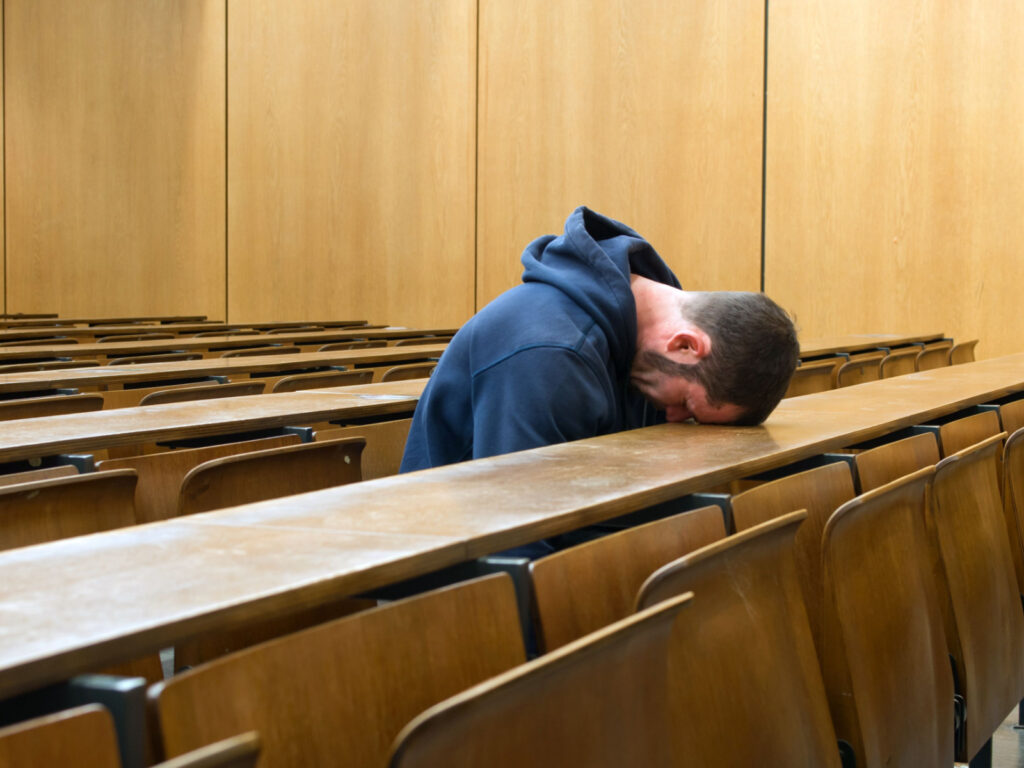Is It Bad to Study at Night?
For most students, it’s before bedtime when their minds are finally free of clutter and the environment is at long last devoid of distractions. As a result of this, the night provides a wonderful opportunity for them to study.
Studying at night can be productive as sleep that follows it helps consolidate the new information. However, spending the entire night studying, such as pulling an all-nighter, can be counterproductive and, in the long run, can cause poor academic performance.
But before anything else, let’s first answer this fundamental question.

How Much Sleep Do Students Need Per Night?
Teenage students 13 to 18 years of age should sleep 8 to 10 hours per night. On the other hand, college-aged individuals should have 7 to 9 hours of sleep per night. Failure to get enough sleep can result in poor academic performance in school as well as an increased risk for health problems such as obesity and type 2 diabetes.
If done improperly, hitting the books late at night can do more harm than good.
What can make late-night studying detrimental is when it keeps students from getting the right amount of sleep — sleep loss can endanger not only their overall health but also their grades!
Sleeping late at night to review should not be a problem for students whose classes start later in the day. Suppose that their first class starts at 2 am.
Then staying awake until 12 midnight the night before to prepare for an exam in, say, algebra or history should still give students the opportunity to have sufficient amounts of shut-eye.
It’s a different thing, however, if students have to be on school grounds at 7 am — the night before, they should be hitting the hay at 9 pm or 12 am to be able to get enough sleep, depending on their age and sleep requirements.
According to a report by The Daily Universe, a Brigham Young University newspaper, sleep-deprived college students are more at risk of losing academic success as a result of worsened cognitive functioning. It adds that students who sleep more hours usually have higher GPAs compared to short-sleepers.
Lack of sleep can also increase certain health risks, which can affect a student’s academic performance.
Why Do I Study Better at Night?
Generally speaking, nighttime studying allows for better information retention due to the fact that it’s quieter and there are fewer distractions. As a result, the acquisition of new and completely unnecessary information can be avoided. Night owls, meanwhile, study better at night due to increased memory and cognitive ability.
Anxiety tends to be worse at night because people who suffer from it often find themselves focusing more on their worries and fears in the absence of distractions commonly found during the day.
Because chances are that you won’t be interrupted by family members and friends and others in your environment, you may find studying at night more engaging and productive.
Even if you are a morning person who is more physically active and mentally receptive early in the day, you could benefit from reviewing just before bedtime when it’s quieter and more relaxing.
While just about any student can benefit from nighttime studying, night owls tend to gain the most from it. Studies after studies confirm that the brains of night owls are more functional in the afternoon and, of course, in the evening.
Great news for non-night owls: you don’t have to stay up that late to have a fruitful review.
According to scientists, the brain is in superb acquisition mode twice a day — from 10 am to 2 pm and from 4 pm to 10 pm.
So, in other words, you could study at night and still enjoy enough Z’s without being late to class the following day.

How Late Should I Stay Up Studying?
Many things need to be taken into account when determining how long a student should stay up to study. One of them is sleep requirements, which can vary from person to person depending on factors such as age and genetics. Students should also consider their schedule to be able to perform in class optimally.
It can be enticing to stay up as late as you possibly can at night if you have a lot of topics to cover or are determined to get a GPA high enough for college admissions or employment purposes.
But you could end up making things worse if you compromise both your sleep and punctuality.
Reviewing up to the wee hours of the night can help you learn everything you need to learn alright.
However, if you overdo it or give it a go without being accustomed to it, you could sacrifice the quality of your studying. Easily, you could end up staying up late at night for nothing except losing much-needed sleep and feeling drowsy in your classes and extracurriculars.
Based on a newsletter from the National Institutes of Health (NIH), lack of sleep could cause your ability to learn new things to drop by as much as 40%, which is why an all-nighter isn’t recommended.
And according to the Sleep Foundation itself, sacrificing sleep for studying does not actually help to improve your academic performance. It adds that, as a matter of fact, spending more time snoring during finals week could help you earn better grades than staying up late night after night to try to learn your lessons.
Have no choice but to stay up late at night to study?
Just make sure that you don’t stay up too late.
Consider your schedule for the following day and do the math to have an idea of what time you should call it a day to still have enough sleep and be on time for your first class.
And if you’re too sleepy, go to bed and wake up earlier than usual to study — studying when your eyelids seem to weigh a ton each is a complete waste of precious time.
Does Studying Before Bed Help?
Scientists say that sleeping after learning something new helps the brain to process new information. Not only does sleeping help strengthen memories formed throughout the day but also links new ones to previously obtained memories. As a matter of fact, sleeping also allows a person to come up with fresh and creative ideas.
Earlier, we established the fact that a reason why studying at night works is that there are fewer distractions around and fewer interruptions, too, thus allowing you to review productively.
But there’s another reason why nighttime reviewing is good for you: the brain processes data better at sleep.
A report by the University of Notre Dame says that individuals who sleep soon after acquiring new knowledge tend to remember details so much better than those who don’t. It adds that going to bed after memorizing things, in a sense, tells the sleeping brain which details to consolidate — the ones that matter the most, of course.
What’s really nice about sleeping as soon as you’re through studying is that it’s beneficial to both episodic memory and semantic memory, or memory for events and memory for facts about the world, respectively.
So, in other words, if your upcoming exam requires you to memorize a lot of things, from dates, figures to formulas, perhaps it’s a wonderful idea for you to consider reviewing intensively when there’s nothing left to do for the day but to sleep — other than a quiet environment, the sleep following the session helps secure everything you have learned in your memory.
However, some scientists agree that pairing this technique with sleeping just before you grab those books and notes can enhance learning further — I will talk more about this matter in a few, so don’t stop reading now!

Are There Disadvantages to Studying at Night?
Since the energy levels of most people are depleted at the end of the day, they usually spend the night sleeping. Nighttime studying, especially among early birds, may feel like a drag. Sleepiness can also keep students from studying effectively and may also lead to poor academic performance if they fail to get a good night’s sleep.
While there are perks that come with studying at night, there are also downsides that should not be overlooked.
Before anything else, let’s make one thing clear: studying at night is not for all students — some may find it beneficial, while others may find it detrimental. It’s important to determine what works for you best.
One of the biggest disadvantages to nighttime studying is that the mind may be too stressed and exhausted to acquire even more information, which can make your review session totally futile.
Of course, you will find it easier to learn things if your brain is attentive instead of longing for a supportive and comfortable pillow.
Because your mind isn’t working properly, you may find it necessary to remain awake longer than intended just to make sure you learn everything you need to learn.
And this is a terrible thing to do as you may end up deprived of that ever-important sleep, which may leave you feeling drowsy during your classes and, more importantly, exams.
What’s more, it’s not all the time that your textbook or the internet can explain things clearly. Late at night, your friends or classmates who have the answers you are looking for may no longer be available to lend a hand.
Lack of sleep as a result of studying at night may impair your mood, increase stress and anxiety levels and decrease cognitive abilities, all of which can negatively affect your on-campus performance.
If poorly executed, needless to say, studying in the nighttime can make things worse, including especially your grades and exam scores, than make them better.
Is It Okay to Pull an All-Nighter?
Pulling frequent all-nighters is strongly discouraged. Because of the negative cognitive effects of sleep deprivation, students may fail to properly learn everything they have covered and also make mistakes the following day, such as while taking exams. In the long run, all-nighters can also cause serious mental and physical health issues.
Simply put, an all-nighter is a single night of having zero sleep. It’s common among students, especially college-level ones who need to submit a project or take an exam the following day.
At first glance, it may appear as though an all-nighter is a wise move.
After all, nothing can give you some much-needed peace and quiet more than the entire night before an important school matter — spending the next 7 to 9 hours reviewing instead of snoring and dreaming about your on-campus crush, of course, is more advantageous for your educational career, right?
Wrong!
Here’s the deal with pulling an all-nighter: a mind that’s desperately longing for some sleep isn’t very good at retaining information and a sleep-deprived mind is very much unlikely to perform optimally the following day.
According to a report by Mattress Advisor, around 20% of college students will pull an all-nighter at least once every month. With up to a fifth of all degree-seeking students having the need to abandon sleep for the sake of studying each month, you may feel that it’s perfectly fine to follow suit.
But is it okay to pull an all-nighter once a month?
More importantly, is it okay to pull an all-nighter once a week?
Doing an all-nighter can disrupt your normal sleep pattern.
Is It Good to Wake Up at 3 am to Study?
Students who cannot seem to study well because of distractions could benefit from waking up at 3 am to hit the books. Without any noise and disturbance, they might enjoy a productive review. After having some sleep, studying very early in the morning could be good for students who are prone to getting insufficient shut-eye.
As mentioned earlier, what’s so nice about studying at night is that it’s less likely for you to get distracted, thus allowing you to concentrate 100% on the materials on your dorm or bedroom desk.
However, having zero distractions is pointless if your eyes are begging for some sleep.
This is when you might want to consider taking a trip to dreamland and waking up at 3 in the morning to study.
At this time of the day, your family and friends and classmates are still asleep, which means that no one will bother you. And since your mind has already enjoyed some sleep for a few hours, it’s rested and refreshed enough to be receptive to new information.
Especially if you are a certified early bird, hopping out of bed at 3 am allows you to cover a lot just in time for your first class of the day, although you may have to sleep earlier than usual to keep sleep deprivation at bay.
Of course, the best time to sleep for an early-morning study session will depend on how much shut-eye you need.
But be warned: waking up at 3 am whenever there’s an exam makes your sleeping pattern irregular.
This, according to health authorities, can negatively affect your metabolism, which regulates your energy levels, and even put you at higher risk for chronic health problems such as type 2 diabetes and heart disease.
Does Sleeping Before Study Help?
Other than sleeping soon after studying, sleeping before studying can also help make the session productive. That’s because it allows the mind to get refreshed, thus priming it for the acquisition of information. So, if a student is feeling sleepy but needs to review, it can be beneficial for him or her to take a nap beforehand.
Experts, as talked about earlier, agree that sleeping right after studying delivers results.
But did you know that many of them confirm, too, that sleeping before you sit at your study desk can be good for you as well, especially if you feel too tired and lethargic to start reviewing?
Take for instance a 2013 report by the NIH: a sleep scientist at the University of California, Berkeley, Dr. Matthew Walker, says that sleep prior to learning helps prepare the brain for initial formation of memories.
He adds that, on the other hand, sleeping after learning cements new information into the brain’s architecture, thus keeping you from forgetting them.
Worry not if there are a lot of things to cover during the review session and you simply cannot afford to take a long, restful sleep beforehand — taking a power nap is enough for you to be able to refresh your mind.
A power nap allows you to feel energized and alert for the next 4 to 6 hours.
Suppose that you are ready to study at 6 pm but your mind is screaming for some sleep. Taking a power nap, which is less than 30 minutes long, can revitalize you enough to study until around 10:30 pm, which gives you plenty of time to get 9 long hours of sleep.
Even if your first class the following day is as early as 8 am, no study or sleep sacrifices are made!
Just Before You Study at Night
If done properly, studying at night can spell the difference between acing your exams and getting a low cumulative GPA. But the operative word is “properly”, which means that there is a right way to do it and there is a wrong way to do it. Taking a power nap before reviewing at night, for instance, is good, while pulling an all-nighter is bad.
Since different students have minds that are more alert and receptive at different times of the day, you should pay attention to what your body is telling you and study your lessons when it’s most convenient and productive for you.
Read Next: How to self-study
Disclaimer: The views and opinions expressed in this article are those of the authors and do not necessarily represent those of the College Reality Check.





